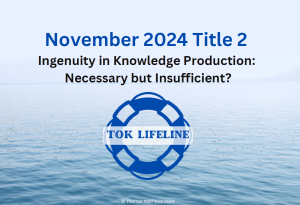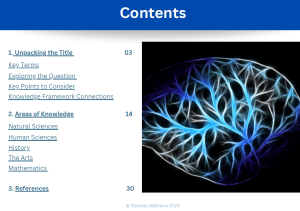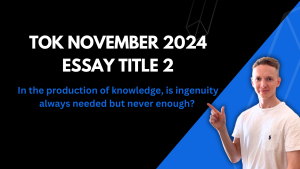In the production of knowledge, is ingenuity always needed but never enough? Discuss with reference to mathematics and one other area of knowledge.
This question focuses on the role of originality and innovation, suggesting that while ingenuity might be crucial, it may not be sufficient on its own.
Understanding Ingenuity in Knowledge Production
First, let’s define what we mean by ingenuity. Ingenuity refers to the ability to be exceptionally creative, original, and innovative. It involves thinking outside the box and coming up with novel solutions to complex problems. In the context of knowledge production, ingenuity can lead to groundbreaking discoveries and advancements.
The Necessity of Ingenuity
Ingenuity is undoubtedly important in the production of knowledge, especially in AOKs like Mathematics and the Natural Sciences. For example:
Mathematics – Major breakthroughs, such as the development of new theorems or solving long-standing mathematical problems, often require a high degree of originality. The famous example of Andrew Wiles proving Fermat’s Last Theorem showcases how ingenious thinking can lead to significant advancements. Wiles combined various mathematical fields in a novel way to solve a problem that had remained unsolved for over 350 years.
Natural Sciences – In fields like physics, chemistry, and biology, ingenuity is essential for discovering new particles, developing innovative technologies, and understanding complex biological processes. The discovery of the Higgs boson, for instance, required ingenious experimental design and theoretical innovation.
Ultimately, ingenuity is often necessary because producing new knowledge frequently involves overcoming significant challenges and limitations of existing methodologies and theories. Without original and innovative thinking, progress can stagnate.
The Insufficiency of Ingenuity Alone
However, while ingenuity is necessary, it is often not enough on its own. The process of knowledge production also relies heavily on other factors:
Validation and Scrutiny – New ideas and discoveries must be rigorously tested, scrutinized, and validated by the wider academic community. In Mathematics, a new theorem must be proven through logical reasoning and peer review. In the Natural Sciences, experimental results must be reproducible and subject to verification by other scientists. Without this critical scrutiny, ingenious ideas cannot gain acceptance or credibility.
Collaboration and Communication – Knowledge production is rarely a solitary endeavor. Collaboration with other experts, effective communication of ideas, and the ability to build on the work of others are crucial components. For instance, the Human Genome Project was a massive collaborative effort involving scientists from around the world, combining their expertise and ingenuity to map the human genome.
Methodological Rigour – The use of robust methods and tools is essential in ensuring that new knowledge is reliable and accurate. In both Mathematics and the Natural Sciences, methodological rigour provides the foundation for validating new discoveries and ensuring they are grounded in solid evidence.
Challenging Absolutes – “Always” and “Never”
The prompt’s use of “always” and “never” presents absolute conditions that can be challenged. While ingenuity is often crucial, there may be instances where knowledge is produced through incremental improvements or the application of established methods. Conversely, even the most ingenious ideas can fall short without the necessary validation, collaboration, and methodological rigour.
For example, in History, the production of knowledge often involves meticulous research, analysis of primary sources, and interpretation of historical evidence. While ingenuity can lead to new interpretations and insights, the rigorous validation of these ideas through evidence and peer review is equally important.
Connecting to the Knowledge Framework
This discussion ties into the methods and tools element of the TOK knowledge framework. The methods and tools used in different areas of knowledge play a critical role in shaping how new knowledge is produced, validated, and accepted. Understanding the interplay between ingenuity and these methods provides a deeper insight into the knowledge production process.



